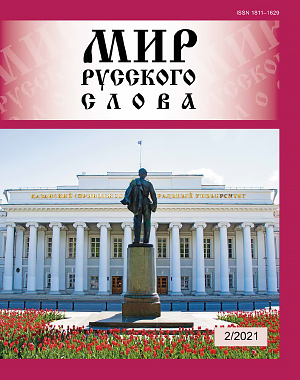The Features оf Joint Use of Units TAKOY and CHISTO in Russian Oral Speech
DOI:
https://doi.org/10.24412/1811-1629-2021-2-45-52Abstract
The article describes the features of joint use of two units — chisto (‘clear’) and takoy(‘such’) — in Russian oral speech. In oral discourse, both chisto and takoy, under the infl uenceof pragmaticization, can move to the communicative-pragmatic level, losing in a varying degreelexical and grammatical meaning, in return for which they acquire pragmatic one (i.e., performa certain function in the text). Th e tendency of pragmaticized units (or pragmatic markers –PMs) to the joint use is one of the problems that makes it diffi cult to annotate them not onlyautomatic, but even manual in the spoken corpus, since these units can either remain functionallyindependent or unite into an integral unit, changing their pragmatics. Th e source of the researchmaterial for the article is the Spoken Subcorpus of the Russian National Corpus. Th e actual user’ssubcorpus of the material includes 74 contexts with the units chistoand takoy. As the analysis proved, 4 models of joint functioningof this units are possible, but only in one of them (<chisto takoyAdj + N / N <…> + Adj>) they are really connected functionally(chisto takaya molodetskaya zabava) and begin to function like anidiom. In addition, the hesitation clusters, or “chains”, which serveas a fi ller for the hesitation pause (for example, when the speakerhas a speech failure), formed a separate group with units chistoand takoy. Addressing to the study of the compatibility of units(and PM in particular) in oral discourse turns out to be promisingboth in the context of “lexicographic portraiture” and in solvingproblems of applied linguistics.Key words: speech corpus annotation; oral speech;pragmatic marker; pragmaticalization; lexicographic portraiture.
Keywords:
speech corpus annotation, oral speech, pragmatic marker, pragmaticalization, lexicographic portraiture
Downloads
References
References
Downloads
Published
How to Cite
Issue
Section
License
Articles of "The World of Russian Word" are open access distributed under the terms of the License Agreement with Saint Petersburg State University, which permits to the authors unrestricted distribution and self-archiving free of charge.




